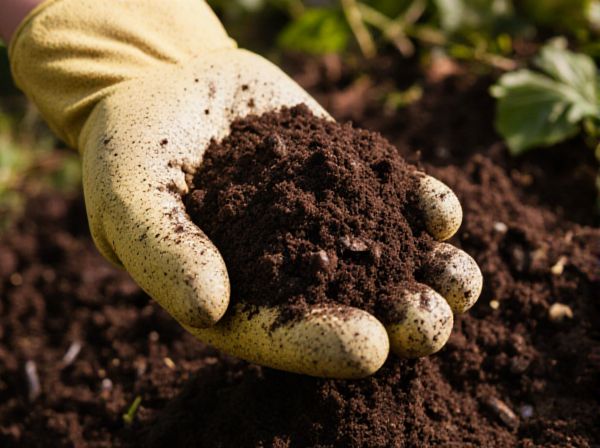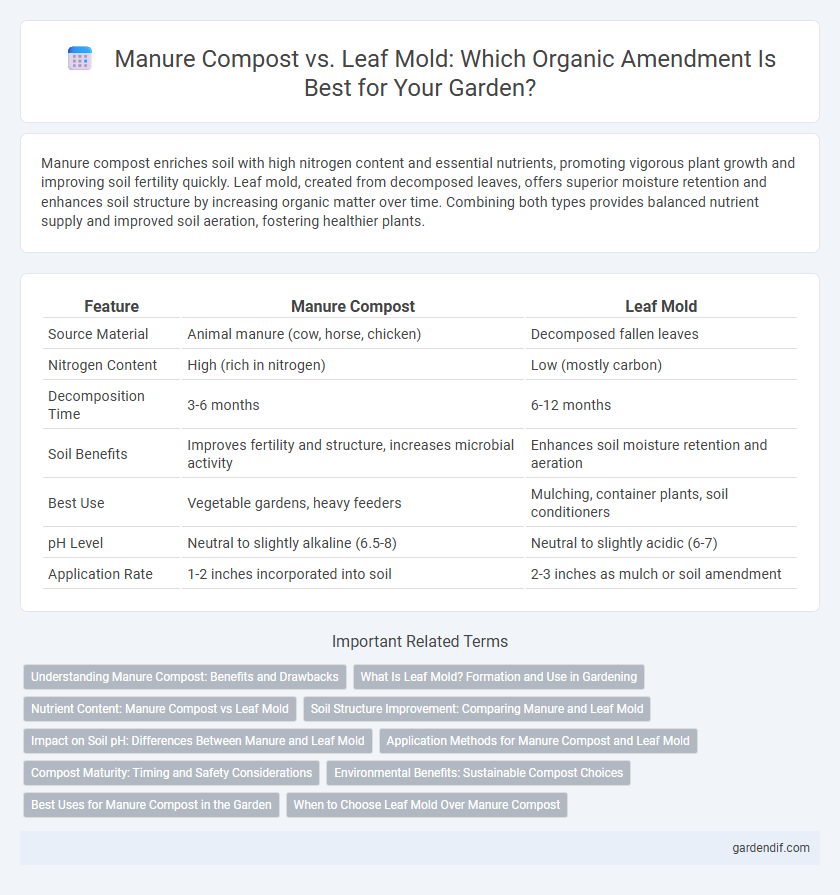
Manure Compost vs Leaf Mold Illustration
Manure compost enriches soil with high nitrogen content and essential nutrients, promoting vigorous plant growth and improving soil fertility quickly. Leaf mold, created from decomposed leaves, offers superior moisture retention and enhances soil structure by increasing organic matter over time. Combining both types provides balanced nutrient supply and improved soil aeration, fostering healthier plants.
Table of Comparison
| Feature | Manure Compost | Leaf Mold |
|---|---|---|
| Source Material | Animal manure (cow, horse, chicken) | Decomposed fallen leaves |
| Nitrogen Content | High (rich in nitrogen) | Low (mostly carbon) |
| Decomposition Time | 3-6 months | 6-12 months |
| Soil Benefits | Improves fertility and structure, increases microbial activity | Enhances soil moisture retention and aeration |
| Best Use | Vegetable gardens, heavy feeders | Mulching, container plants, soil conditioners |
| pH Level | Neutral to slightly alkaline (6.5-8) | Neutral to slightly acidic (6-7) |
| Application Rate | 1-2 inches incorporated into soil | 2-3 inches as mulch or soil amendment |
Understanding Manure Compost: Benefits and Drawbacks
Manure compost is rich in nitrogen and essential nutrients, making it highly effective for enriching soil fertility and promoting vigorous plant growth. It improves soil structure and moisture retention but can introduce pathogens or weed seeds if not properly aged or composted. Understanding these benefits and drawbacks helps gardeners optimize manure compost use while minimizing potential risks.
What Is Leaf Mold? Formation and Use in Gardening
Leaf mold is a type of compost created by the slow decomposition of fallen leaves, primarily through fungal activity, resulting in a dark, crumbly material rich in organic matter. It forms over a period of one to three years in moist, shaded environments, where leaves break down naturally without the addition of nitrogen-rich materials found in manure compost. Leaf mold enhances soil structure, improves water retention, and supports beneficial microbial life, making it an excellent soil conditioner for gardening and seed starting.
Nutrient Content: Manure Compost vs Leaf Mold
Manure compost is rich in essential nutrients like nitrogen, phosphorus, and potassium, making it highly effective for boosting soil fertility and plant growth. Leaf mold, composed primarily of decomposed leaves, offers lower nutrient concentrations but significantly enhances soil structure and moisture retention. The nutrient-dense profile of manure compost contrasts with the organic matter benefits provided by leaf mold, influencing their roles in soil amendment strategies.
Soil Structure Improvement: Comparing Manure and Leaf Mold
Manure compost significantly enhances soil structure by increasing organic matter content and promoting microbial activity, which improves soil aggregation and aeration. Leaf mold excels in improving soil texture by increasing moisture retention and fostering beneficial microbial life, making it ideal for sandy or clay soils. Both amendments enhance soil fertility, but manure compost provides more immediate nutrient availability, while leaf mold contributes to long-term soil health and structure stability.
Impact on Soil pH: Differences Between Manure and Leaf Mold
Manure compost typically raises soil pH due to its alkaline nature, making it ideal for neutralizing acidic soils, while leaf mold tends to lower soil pH by introducing organic acids, beneficial for acid-loving plants. The nitrogen and mineral content in manure compost accelerates microbial activity, enhancing soil fertility, whereas leaf mold improves soil structure and moisture retention without significantly altering pH levels. Understanding these distinct impacts allows gardeners to select the appropriate amendment for specific soil pH management and plant health goals.
Application Methods for Manure Compost and Leaf Mold
Manure compost is typically applied by incorporating it directly into soil to improve nutrient content and enhance microbial activity, often used in vegetable gardens and crop fields for its high nitrogen levels. Leaf mold is applied primarily as a mulch or soil conditioner to improve soil structure and moisture retention, benefiting acid-loving plants and woodland gardens. Both materials require proper curing to avoid plant burn and ensure effective nutrient release during application.
Compost Maturity: Timing and Safety Considerations
Manure compost typically reaches maturity within 3 to 6 months due to its high nitrogen content, promoting faster microbial activity and decomposition, but requires careful monitoring to avoid pathogens and chemical residues. Leaf mold compost matures more slowly, often taking 12 to 18 months, as it relies on fungal decomposition of cellulose-rich leaves, resulting in a safer, nutrient-stable product free from weed seeds and harmful bacteria. Using a compost thermometer and conducting stability tests ensure both manure compost and leaf mold achieve safe maturity levels, critical for effective soil amendment and plant health.
Environmental Benefits: Sustainable Compost Choices
Manure compost enriches soil with essential nutrients like nitrogen, phosphorus, and potassium while improving soil structure and moisture retention, making it a highly sustainable choice for agriculture. Leaf mold primarily enhances soil organic matter and water-holding capacity by fostering beneficial microbial activity, promoting healthier plant growth with minimal environmental impact. Choosing manure compost or leaf mold contributes to reducing landfill waste and lowering greenhouse gas emissions, supporting eco-friendly waste management and sustainable gardening practices.
Best Uses for Manure Compost in the Garden
Manure compost is rich in nitrogen, phosphorus, and potassium, making it ideal for vegetable gardens and flower beds that require nutrient-dense soil enrichment. Its ability to improve soil structure and moisture retention supports root development and promotes healthy plant growth. Using well-aged manure compost ensures safe application without burning plants, enhancing overall garden productivity.
When to Choose Leaf Mold Over Manure Compost
Leaf mold is ideal for improving soil structure and moisture retention in shady or acidic garden beds where nutrient input is less critical. Choose leaf mold over manure compost when working with seedlings or delicate plants that require gentle, slow-release organic matter without the risk of nutrient burn. Its higher lignin content and slower decomposition rate make leaf mold preferable for long-term soil conditioning rather than rapid nutrient supplementation.
Manure Compost vs Leaf Mold Infographic

 gardendif.com
gardendif.com